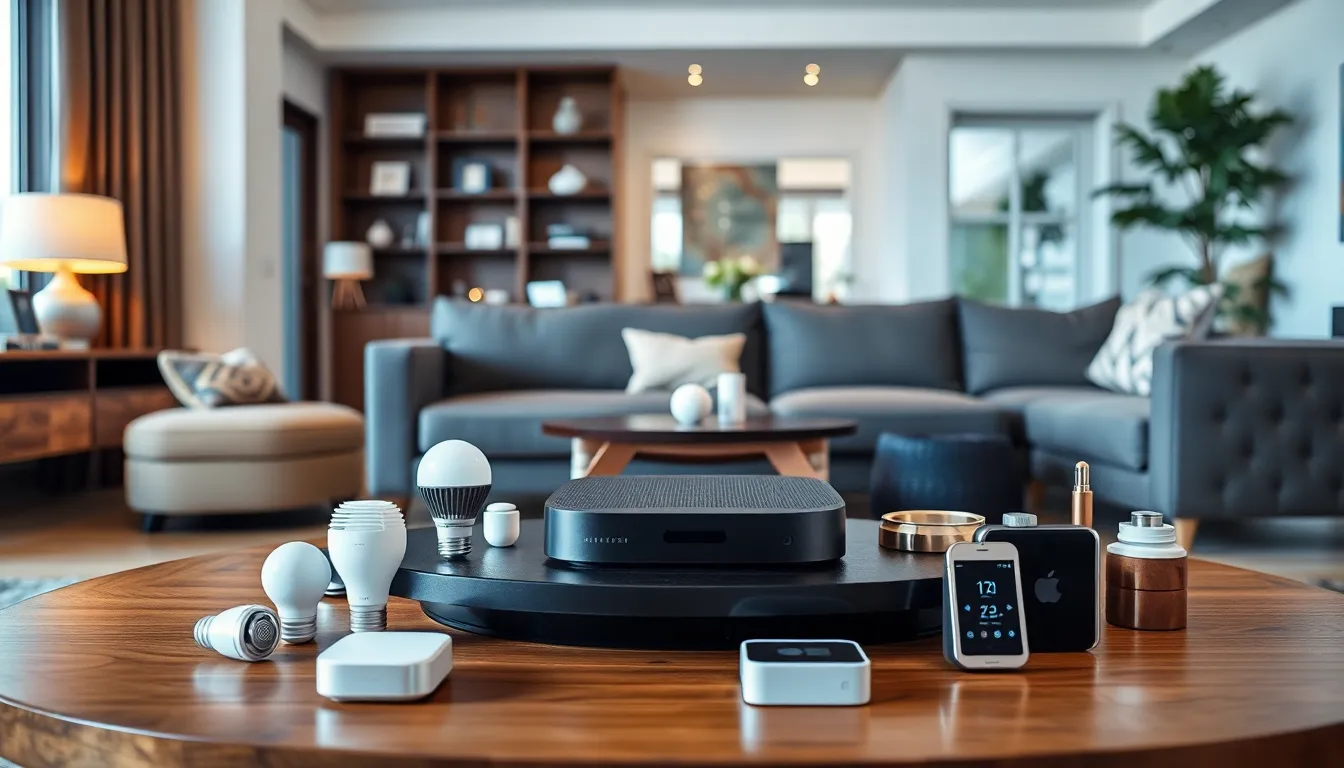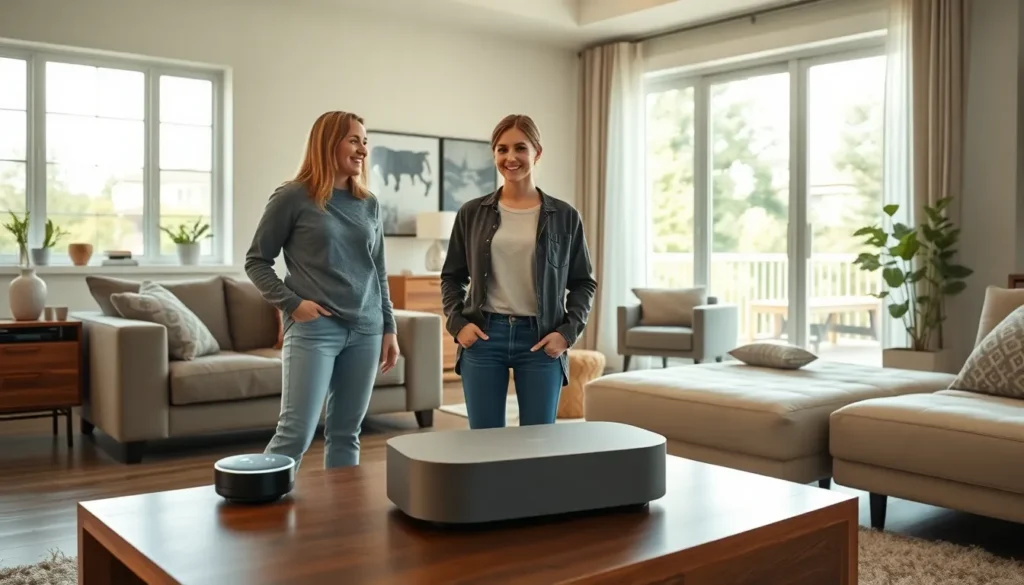Home hub systems are revolutionizing the way people interact with technology in their daily lives. These centralized devices serve as the command center for smart homes, connecting everything from lights and thermostats to security cameras and entertainment systems. As more households embrace smart technology, understanding the benefits and functionalities of home hub systems becomes essential.
With the right home hub, users can streamline their daily routines, enhance energy efficiency, and improve security. These systems not only simplify device management but also enable automation and remote control, making life more convenient. Whether someone is tech-savvy or just starting to explore smart home options, home hub systems offer a gateway to a more connected and efficient lifestyle.
Table of Contents
ToggleOverview of Home Hub Systems
Home hub systems serve as centralized control points for a variety of smart devices throughout a household. These systems connect multiple devices such as lights, thermostats, cameras, and locks to create an integrated smart home environment. With real-time communication among devices, users experience seamless automation, simplifying interactions with technology.
Home hubs support various protocols, including Zigbee, Z-Wave, and Wi-Fi, ensuring compatibility with a wide range of smart devices. Some popular home hub brands include Samsung SmartThings, Amazon Echo Plus, and Google Nest Hub, each offering distinctive features and capabilities. These hubs enable users to manage devices through mobile apps or voice commands, enhancing convenience and accessibility.
Through scheduling and automation features, home hubs optimize energy consumption, resulting in lower utility bills. Users can create routines that automatically adjust lighting and heating based on their daily schedules. For instance, setting a “Good Morning” routine can turn on lights, adjust the thermostat, and start a coffee maker simultaneously.
Enhanced security is another key benefit of home hub systems. Users can monitor security cameras and receive alerts about suspicious activity from any location. Integration with smart locks allows remote access control, improving home security while providing peace of mind.
Understanding home hub systems is essential for those looking to enhance their smart home experience. By centralizing control, these systems streamline daily routines, increase energy efficiency, and elevate security measures in homes.
Key Features of Home Hub Systems

Home hub systems offer essential features that enhance smart home functionality through seamless integration and user convenience. They cater to diverse preferences, making smart home technology accessible for everyone.
Smart Device Compatibility
Smart device compatibility represents a crucial feature of home hub systems. These hubs support multiple communication protocols, including Zigbee, Z-Wave, and Wi-Fi. This support allows connection with numerous smart devices, such as lights, sensors, and appliances, from various brands. For instance, a home hub can simultaneously manage devices from Philips Hue, August Smart Lock, and Nest Thermostat. This versatility eliminates the need for separate apps, simplifying user experiences.
User-Friendly Interfaces
User-friendly interfaces enhance the accessibility of home hub systems. Most hubs offer intuitive mobile applications and voice control options that streamline interaction. Users can easily access device controls, set schedules, and create automation routines with just a few taps or voice commands. For example, a user can adjust home lighting, check security cameras, or modify thermostat settings all from one central application. This ease of use fosters a positive experience, encouraging broader adoption of smart home technologies.
Benefits of Home Hub Systems
Home hub systems offer numerous advantages, enhancing the overall smart home experience through automation, energy efficiency, and improved security.
Home Automation
Home automation significantly simplifies daily tasks by allowing users to control multiple devices from a single interface. Users can program routines, such as turning off lights at bedtime or adjusting thermostats based on occupancy, ensuring a smoother lifestyle. Integration of voice control enables hands-free management, making it accessible for all household members. Through automation, home hub systems streamline chores and improve overall comfort, responding to user preferences and schedule.
Energy Efficiency
Energy efficiency benefits arise as home hub systems optimize energy consumption. Users can set specific times for appliances, heating, and cooling systems to operate, reducing unnecessary energy usage. For instance, smart thermostats can adjust temperatures based on real-time occupancy data, saving on heating and cooling costs. Additionally, users can monitor energy consumption patterns through mobile apps, allowing them to make informed decisions about usage and identify areas for improvement, ultimately leading to lower utility bills and a reduced carbon footprint.
Popular Home Hub Systems in the Market
Several home hub systems dominate the market, each offering unique features and functionalities tailored to enhance smart home experiences. Below are three prominent systems that exemplify the advantages of home hubs.
System 1: Samsung SmartThings
Samsung SmartThings serves as a versatile home hub, supporting multiple protocols such as Zigbee and Z-Wave. Users enjoy seamless integration with an array of smart devices, enabling centralized control through the SmartThings app. Key features include:
- Device Compatibility: Supports thousands of devices, from lights to sensors, simplifying user experiences.
- Automation Routines: Allows users to create automation routines based on schedules or events, enhancing convenience.
- Voice Control: Integrates with voice assistants like Amazon Alexa and Google Assistant, permitting hands-free operation.
System 2: Amazon Echo Plus
Amazon Echo Plus functions as both a smart speaker and a home hub, providing robust connectivity for various devices. This system excels in user-friendliness and compatibility, featuring:
- Built-In Zigbee Hub: Eliminates the need for a separate hub for Zigbee devices, streamlining setups for users.
- Alexa Integration: Offers advanced voice capabilities, enabling control of smart devices through simple voice commands.
- Smart Home Routines: Users can set customized routines that automate daily tasks, improving energy efficiency and convenience.
System 3: Google Nest Hub
Google Nest Hub focuses on visual interaction, featuring a touchscreen display that enhances user engagement. This system stands out with its intuitive interface and comprehensive functionalities, which include:
- Google Assistant Integration: Users benefit from advanced Google Assistant features, making information access and device control effortless.
- Scheduling and Reminders: Users can create reminders and schedules directly through the hub, enhancing organization.
- Home Monitoring: Supports integration with security cameras and smart locks, enabling remote surveillance and increased security.
These home hub systems provide powerful capabilities, ensuring users can efficiently manage their smart home environments.
Home hub systems are revolutionizing how individuals interact with their smart devices. By serving as a central command center, these systems enhance convenience and efficiency in daily life. With features like automation and remote control, they cater to various user needs while simplifying the management of multiple devices.
As smart technology continues to evolve, the importance of home hubs in creating a cohesive and user-friendly environment cannot be overstated. They not only streamline routines but also promote energy efficiency and bolster security measures. Embracing a home hub system is a significant step toward a smarter, more connected living space.



